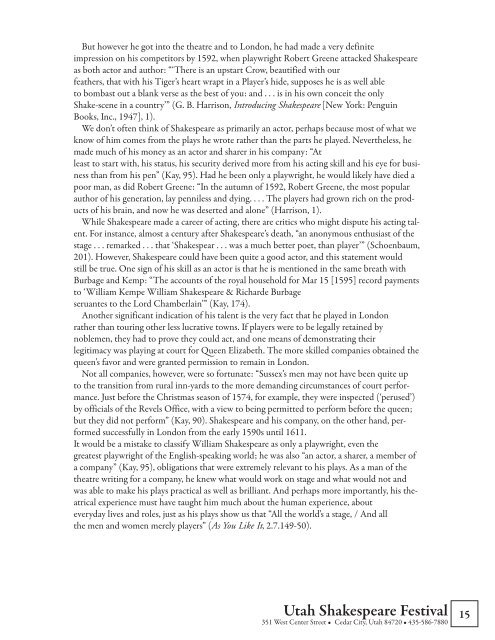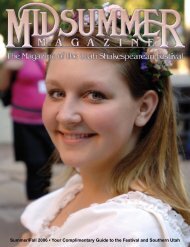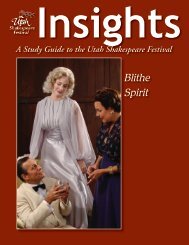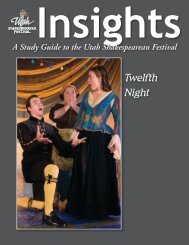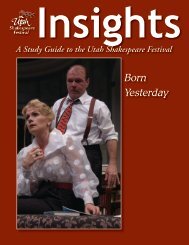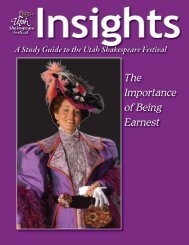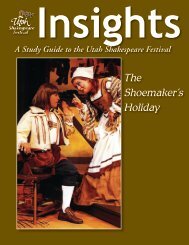View and print the complete guide in a pdf file. - Utah ...
View and print the complete guide in a pdf file. - Utah ...
View and print the complete guide in a pdf file. - Utah ...
You also want an ePaper? Increase the reach of your titles
YUMPU automatically turns print PDFs into web optimized ePapers that Google loves.
But however he got <strong>in</strong>to <strong>the</strong> <strong>the</strong>atre <strong>and</strong> to London, he had made a very def<strong>in</strong>iteimpression on his competitors by 1592, when playwright Robert Greene attacked Shakespeareas both actor <strong>and</strong> author: “‘There is an upstart Crow, beautified with ourfea<strong>the</strong>rs, that with his Tiger’s heart wrapt <strong>in</strong> a Player’s hide, supposes he is as well ableto bombast out a blank verse as <strong>the</strong> best of you: <strong>and</strong> . . . is <strong>in</strong> his own conceit <strong>the</strong> onlyShake-scene <strong>in</strong> a country’” (G. B. Harrison, Introduc<strong>in</strong>g Shakespeare [New York: Pengu<strong>in</strong>Books, Inc., 1947], 1).We don’t often th<strong>in</strong>k of Shakespeare as primarily an actor, perhaps because most of what weknow of him comes from <strong>the</strong> plays he wrote ra<strong>the</strong>r than <strong>the</strong> parts he played. Never<strong>the</strong>less, hemade much of his money as an actor <strong>and</strong> sharer <strong>in</strong> his company: “Atleast to start with, his status, his security derived more from his act<strong>in</strong>g skill <strong>and</strong> his eye for bus<strong>in</strong>essthan from his pen” (Kay, 95). Had he been only a playwright, he would likely have died apoor man, as did Robert Greene: “In <strong>the</strong> autumn of 1592, Robert Greene, <strong>the</strong> most popularauthor of his generation, lay penniless <strong>and</strong> dy<strong>in</strong>g. . . . The players had grown rich on <strong>the</strong> productsof his bra<strong>in</strong>, <strong>and</strong> now he was deserted <strong>and</strong> alone” (Harrison, 1).While Shakespeare made a career of act<strong>in</strong>g, <strong>the</strong>re are critics who might dispute his act<strong>in</strong>g talent.For <strong>in</strong>stance, almost a century after Shakespeare’s death, “an anonymous enthusiast of <strong>the</strong>stage . . . remarked . . . that ‘Shakespear . . . was a much better poet, than player’” (Schoenbaum,201). However, Shakespeare could have been quite a good actor, <strong>and</strong> this statement wouldstill be true. One sign of his skill as an actor is that he is mentioned <strong>in</strong> <strong>the</strong> same breath withBurbage <strong>and</strong> Kemp: “The accounts of <strong>the</strong> royal household for Mar 15 [1595] record paymentsto ‘William Kempe William Shakespeare & Richarde Burbageseruantes to <strong>the</strong> Lord Chamberla<strong>in</strong>’” (Kay, 174).Ano<strong>the</strong>r significant <strong>in</strong>dication of his talent is <strong>the</strong> very fact that he played <strong>in</strong> Londonra<strong>the</strong>r than tour<strong>in</strong>g o<strong>the</strong>r less lucrative towns. If players were to be legally reta<strong>in</strong>ed bynoblemen, <strong>the</strong>y had to prove <strong>the</strong>y could act, <strong>and</strong> one means of demonstrat<strong>in</strong>g <strong>the</strong>irlegitimacy was play<strong>in</strong>g at court for Queen Elizabeth. The more skilled companies obta<strong>in</strong>ed <strong>the</strong>queen’s favor <strong>and</strong> were granted permission to rema<strong>in</strong> <strong>in</strong> London.Not all companies, however, were so fortunate: “Sussex’s men may not have been quite upto <strong>the</strong> transition from rural <strong>in</strong>n-yards to <strong>the</strong> more dem<strong>and</strong><strong>in</strong>g circumstances of court performance.Just before <strong>the</strong> Christmas season of 1574, for example, <strong>the</strong>y were <strong>in</strong>spected (‘perused’)by officials of <strong>the</strong> Revels Office, with a view to be<strong>in</strong>g permitted to perform before <strong>the</strong> queen;but <strong>the</strong>y did not perform” (Kay, 90). Shakespeare <strong>and</strong> his company, on <strong>the</strong> o<strong>the</strong>r h<strong>and</strong>, performedsuccessfully <strong>in</strong> London from <strong>the</strong> early 1590s until 1611.It would be a mistake to classify William Shakespeare as only a playwright, even <strong>the</strong>greatest playwright of <strong>the</strong> English-speak<strong>in</strong>g world; he was also “an actor, a sharer, a member ofa company” (Kay, 95), obligations that were extremely relevant to his plays. As a man of <strong>the</strong><strong>the</strong>atre writ<strong>in</strong>g for a company, he knew what would work on stage <strong>and</strong> what would not <strong>and</strong>was able to make his plays practical as well as brilliant. And perhaps more importantly, his <strong>the</strong>atricalexperience must have taught him much about <strong>the</strong> human experience, abouteveryday lives <strong>and</strong> roles, just as his plays show us that “All <strong>the</strong> world’s a stage, / And all<strong>the</strong> men <strong>and</strong> women merely players” (As You Like It, 2.7.149-50).<strong>Utah</strong> Shakespeare Festival351 West Center Street • Cedar City, <strong>Utah</strong> 84720 • 435-586-788015


